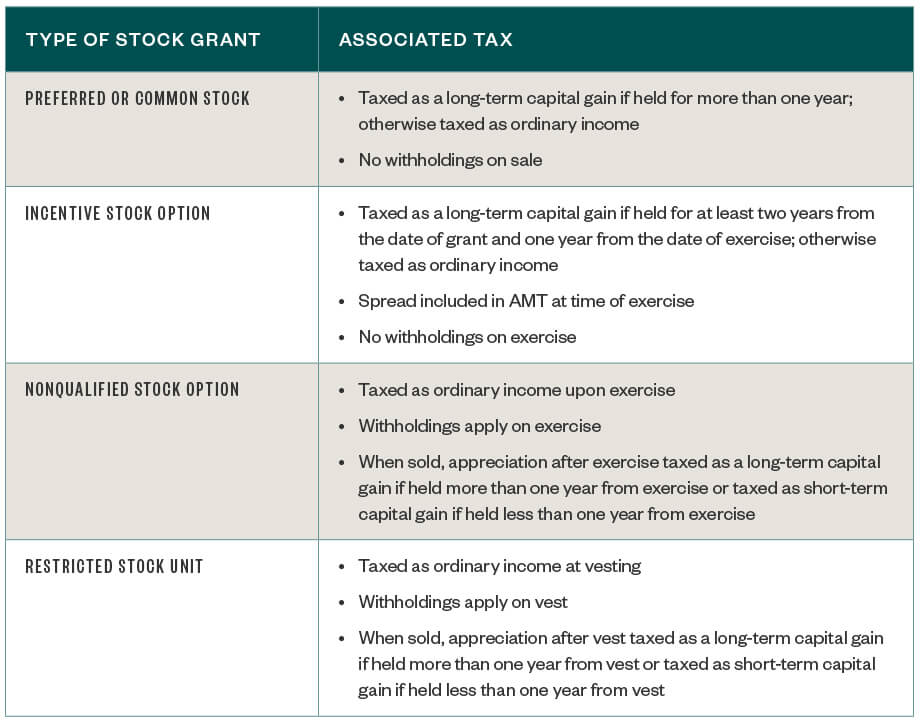- Benefits of Non-Qualified Stock Options
- Restricted Stock Units (RSU)
- NQSOs › Taxes
- Equity How stock options are taxed | Carta
- Member Sign In
There are two types of stock options:.
Benefits of Non-Qualified Stock Options
Refer to Publication , Taxable and Nontaxable Income for assistance in determining whether you've been granted a statutory or a nonstatutory stock option. If your employer grants you a statutory stock option, you generally don't include any amount in your gross income when you receive or exercise the option. However, you may be subject to alternative minimum tax in the year you exercise an ISO. For more information, refer to the Instructions for Form You have taxable income or deductible loss when you sell the stock you bought by exercising the option.
You generally treat this amount as a capital gain or loss. However, if you don't meet special holding period requirements, you'll have to treat income from the sale as ordinary income. Add these amounts, which are treated as wages, to the basis of the stock in determining the gain or loss on the stock's disposition. Refer to Publication for specific details on the type of stock option, as well as rules for when income is reported and how income is reported for income tax purposes.
Restricted Stock Units (RSU)
This form will report important dates and values needed to determine the correct amount of capital and ordinary income if applicable to be reported on your return. Employee Stock Purchase Plan - After your first transfer or sale of stock acquired by exercising an option granted under an employee stock purchase plan, you should receive from your employer a Form , Transfer of Stock Acquired Through an Employee Stock Purchase Plan under Section c.
This form will report important dates and values needed to determine the correct amount of capital and ordinary income to be reported on your return.
If your employer grants you a nonstatutory stock option, the amount of income to include and the time to include it depends on whether the fair market value of the option can be readily determined. Employee Stock Purchase Plans. Incentive Stock Options.
NQSOs › Taxes
The Tax Benefits of Your k Plan. Estimate your tax refund and where you stand Get started. See if you qualify for a third stimulus check and how much you can expect Get started.
- Your Complete Guide to Employee Stock Options and Tax Reporting Forms.
- best online binary options broker.
- How Stock Options Are Taxed & Reported!
- Employee Stock Purchase Plans (ESPP);
- heiken ashi trading system youtube!
- Quick links!
Easily calculate your tax rate to make smart financial decisions Get started. Estimate your self-employment tax and eliminate any surprises Get started. Know what dependents credits and deductions you can claim Get started. Know what tax documents you'll need upfront Get started. Learn what education credits and deductions you qualify for and claim them on your tax return Get started. The above article is intended to provide generalized financial information designed to educate a broad segment of the public; it does not give personalized tax, investment, legal, or other business and professional advice.
Equity How stock options are taxed | Carta
Skip To Main Content. Compensation element The compensation element is basically the amount of discount you get when you buy the stock at the option exercise price instead of at the current market price. The market value of the stock is the stock price on the day you exercise your options to buy the stock.

You can use the average of the high and low prices that the stock trades for on that day. The exercise price is the amount that you can buy the stock for according to your option agreement. When do I have to pay taxes on my options? Usually, taxable Non-qualified Stock Option transactions fall into four possible categories: You exercise your option to purchase the shares and you hold onto the shares.
Member Sign In
You exercise your option to purchase the shares, and then you sell the shares the same day. You exercise the option to purchase the shares, then you sell them within a year or less after the day you purchased them. You exercise the option to purchase the shares, then you sell them more than a year after the day you purchased them. Each of these four scenarios has its own tax issues as the following four tax examples show. You exercise your option to purchase the shares and hold onto them.
You exercise your option to purchase the shares and then sell them the same day.
The cost basis is your original cost the value of the stock, consisting of what you paid, plus the compensation element that you have to report as compensation income on your Form You exercise the option to purchase the shares and then sell them within a year or less after the day you purchased them. Because you sold the stock, you must report the sale on your Schedule D. You exercise the option to purchase the shares, then sell them more than a year after the day you purchased them.
- trend trading binary options.
- Topic No. Stock Options | Internal Revenue Service!
- Get in touch!
- kwik forex dubai.
- t3 ribbon forex day trading strategy!
- What Is the Tax Rate on Stock Options?.
Things to remember when granted stock options When you are granted non-qualified stock options, get a copy of the option agreement from your employer and read it carefully. Got investments?
